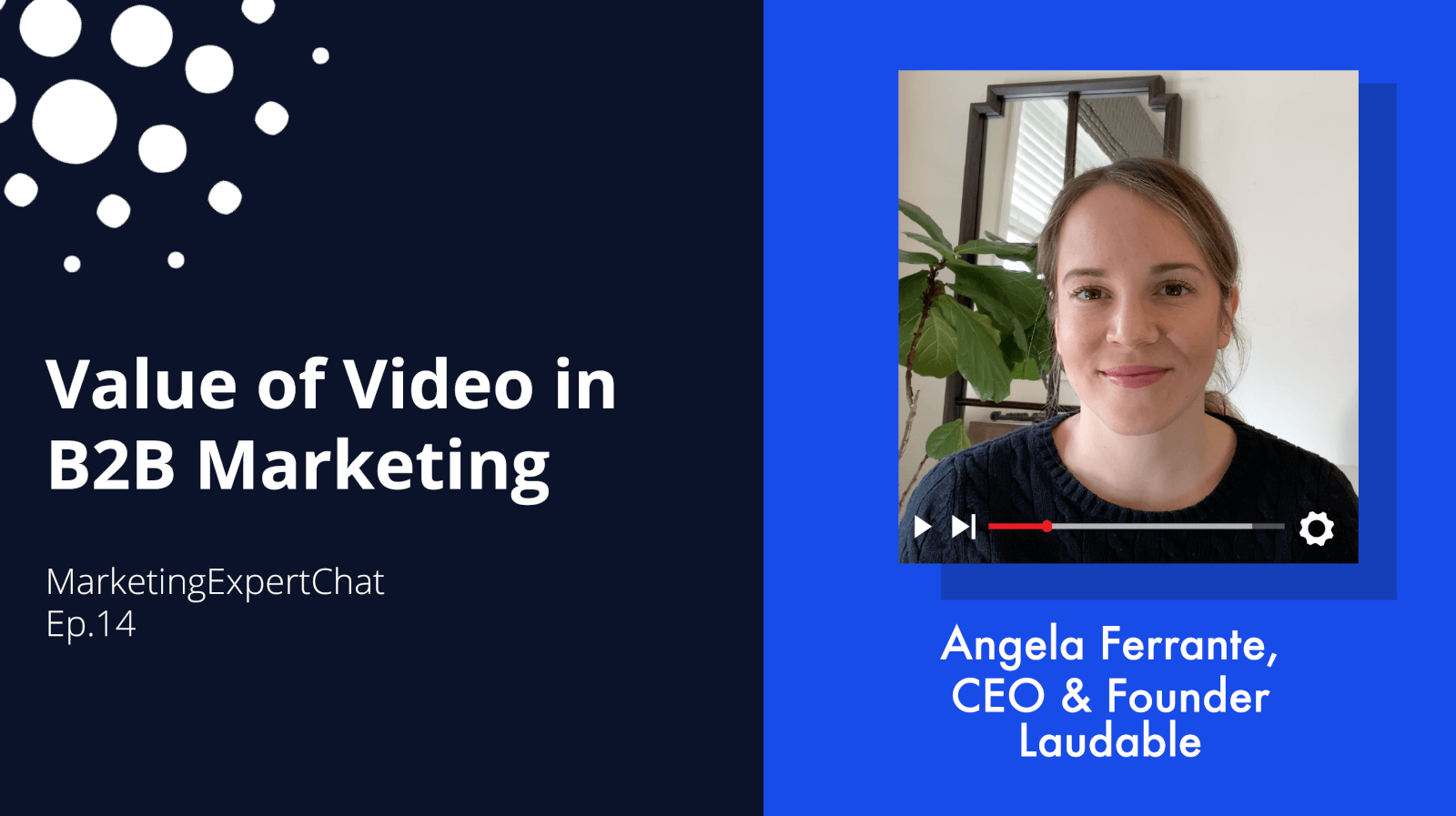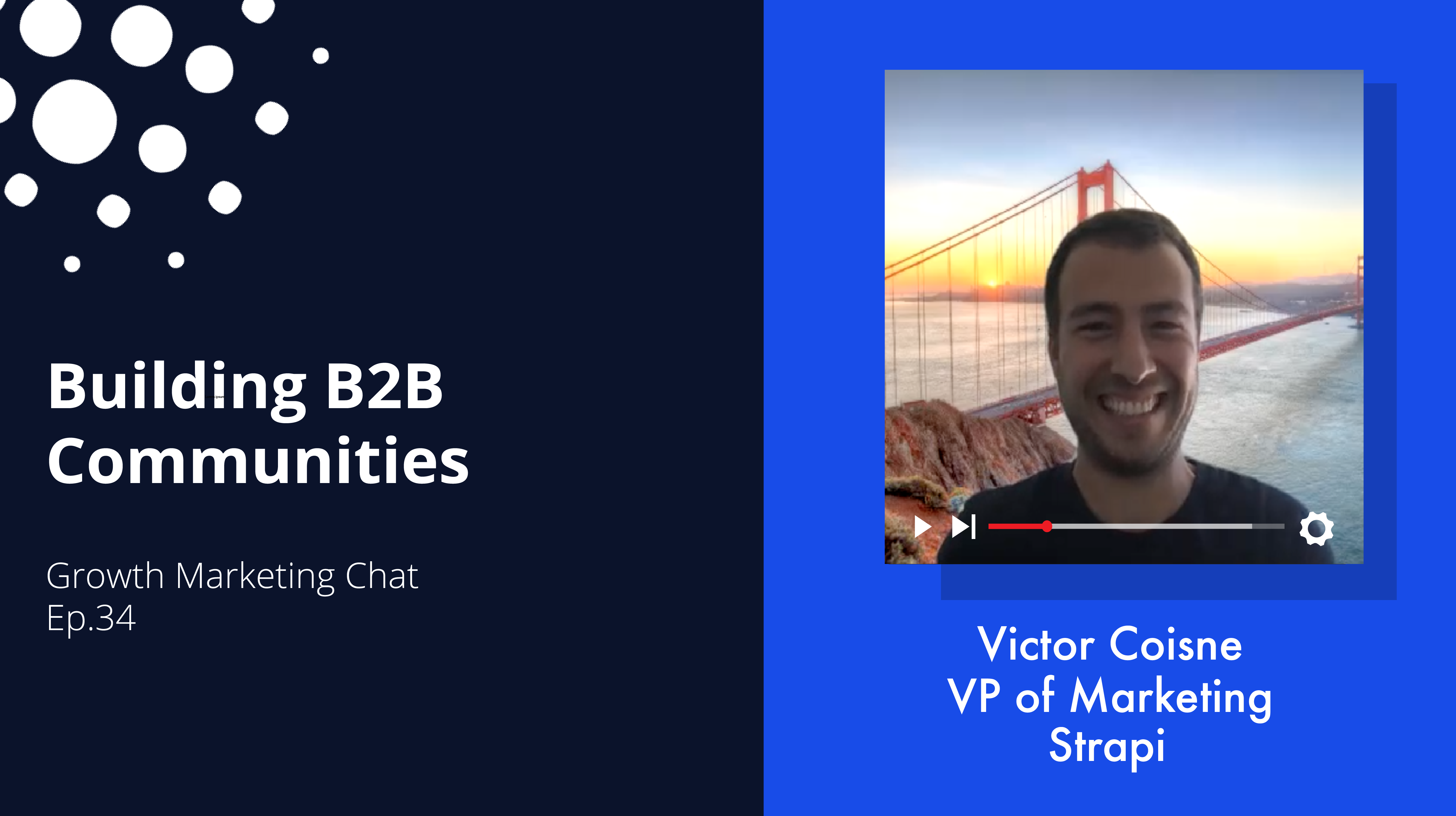Robyn Hazelton, VP of Marketing Growth at Intellum, joined us for our latest Growth Marketing Chat to dive into the main difference between B2B and B2C when it comes to growth marketing.
Hazelton discussed her own marketing journey and revealed what it takes to succeed as a marketer in B2B and B2C. While conversion metrics and messaging must differ between B2B and B2C, being resourceful, creative, thoughtful, and talking to customers & other departments daily can help any marketer contribute meaningfully.
“....What my goal is, should be no different than our sales goals... It's so important for me to be on the same page with our VP of product. It's so important for me to be on the same page with customer success and our VP of sales. [And] if I'm not, I candidly shouldn't be employed.” -Robyn Hazelton, VP of Marketing Growth at Intellum
The Key to Marketing Success in B2B and B2C
Learn from an expert marketer as Hazelton shares the most important differences between B2B and B2C, and how marketers can succeed in both by:
-
Aligning goals with other departments
-
Being resourceful when marketing
-
Paying attention to the ICP
-
Pulling client education materials into the funnel
-
Turning CTAs into trust signals
-
And much more...
Watch the full interview to learn more about how to become an excellent growth marketer, educator, and communicator.
Video Transcript:
NICK: All right. Welcome everybody. Today we have a very exciting guest, Robyn Hazelton, vice president of marketing growth at Intellum. Intellum helps large brands and fast moving companies, increase revenue and decrease support costs through education, Robyn, welcome to Growth Marketing Chat.
ROBYN: Thanks for having me, Nick. I'm excited to be here.
NICK: Thank you so much for being here. So maybe we can start by having you talk about your background and, and kind of your journey through marketing. What led you to the current role with Intellum?
ROBYN: That is that's a history lesson. My background is in sport business management, so I did my master's in sport business management. I was really interested in the business mechanics behind how, how brands or athletes are making money. So I did an internship in PR with track and field Canada, and it just sort of took off from there. I loved every minute of it. I got involved in events both internationally and nationally was the sort of media point for the 2012 Olympic games, which was like huge and really fun, great experience. Post 2012 Olympic games, I moved into consumer marketing. So I went to a dentist who owned several locations and franchises across Ontario fun fact Canadian and live now in the us, but Canadian. And he, that opportunity allowed me to learn what advertising really did and what demand really did can do for, for business in the bottom line had a very massive advertising budget, as you can imagine, the keyword dentist is really expensive.
So just learned a lot absorbed a lot and thought, you know, as one of several thousands of marketers that was on the B2C side, like maybe this would be really fun on the B2B side. I bet I could do a lot of things differently. And think about the approach differently coming from a consumer side and onto a business side mm-hmm <affirmative> I had to convince some brands to let me do that and play with that. Right. But eventually it got my, got got into tech, got into B2B and you know, have just sort of applied all the things I've learned, both in PR and consumer advertising, consumer relationships to the business world and, or the B2B bus B2B world. And that is sort of the story, I guess.
NICK: No, I thank you for that. I love the PR the B2C, the B2B you've dabbled in a few different things. And I think I've, you know, I interview a lot of leaders in marketing and, and that kind of well rounded background, I think really helps you elevate the corporate ladder right. In marketing, because there's a lot going on and it helps to understand a wider birth of disciplines and things that actually contribute to communications.
ROBYN: Yeah. There's so many good story, like so many good things I learned along the way I learned PR. I learned that I'm not a writer. I never want, I'm not a writer. I know that about myself. I, I can see the big picture. I understand the story, but am I the person that should write the sentences on paper? Absolutely not. And I learned that so good lesson and the same, the same applies, right? Like a lot, a lot of what you see on LinkedIn today is B2B is 30 years or 20 years behind B2C. And I wholeheartedly agree. And so that's really where it came from is like, I just felt like I could be doing more and the ticket item and the value that I could be bringing to businesses bottom line or revenue would be so much more impactful if I was applying some of these tactics to B2B.
NICK: Interesting. Let's, let's dive into that a little bit more. What do you see as the, kind of the big contrast between B2C and B2B marketing and what are some of the lessons that you were able to apply and leverage from your B2C backgrounds.
ROBYN: Well, let's talk about conversion. Let's talk about messaging. Okay. Gotcha. Okay. Okay. I'll start again. Some of the biggest differences or lessons that I've learned. I think two things, conversion metrics are not the same in B2B world, as it is in B2C. And while I can say tactics behind advertising can be similar and messaging and targeting can be similar. I don't the expectation that you're going to, you're gonna come away with business immediately is something that I had to learn. And then I would say the same thing about messaging, right? Like one of my differences with marketing leaders is the BDR team reports up through me. And I identified that sort of really early on in the B2B world because I needed people to test messaging and I needed to understand if it was working or not. So, as I listened to what our customers were saying, I needed to apply that message or those components of messages, to new people and fast and wide and hard, the way that I was able to control the message and deliver that message was through the BDR team. And so luckily for me, it is been very, very successful and we're controlling the message, but also delivering into active pipeline and fundamentally, like, I can get us on a soapbox for a super long time, but fundamentally I want them, and like for the BDR team to report up to us, I think there's so much opportunity for both that role in the future, but also for the company to understand what is working and what is not working through through that channel.
NICK: Yeah. Yeah, I actually have some experience in this as well. Not necessarily with, with BDRs, but with outbound email and testing audiences, outbound email. Yeah. and, and seeing what resonates and it doesn't cost too much and you can be very, very targeted and you can approach the, the perfect audience. That actually is, is the ICP right. And go after them. And then, and then once you extrapolate those insights on what it's working, you can multiply that across other marketing channels.
ROBYN: Exactly. Like, and, and specifically within Intellum one of the challenges that we continue to see, right, is the idea that education or learning live lives fundamentally in so many places within these large specially for us, right. Enterprise clients or enterprise customers, the home of education is different everywhere. So it might sometimes live in marketing. It might sometimes live in customer success. Sometimes sales has a component of that and you're like, wait, why, but, or, you know, some case scenario, it's its own department and their focused solely on employees, and you want them to turn their, their attention to customers and partners, and that, you know, those people are, need to hear the message differently and need to feel the pain points differently. So it's something we, we are super cognizant of here at Intellum specifically, but then more so, because the people that are purchasing from us are of all different personas.
NICK: I think that holistic approach and, and having multi multiple departments, right. Kind of working together and, and, and when an integrated approach is, is the, is the the name of the game these days. And, and oftentimes marketing is the, is a sort of the tip of the spear, right. We're the, the first ones along with the BDRs who, who are interacting and getting feedback from the marketplace, how do you maybe in this role or past roles, how, how have you aligned with sales with customer success you know, to maybe with product to really integrate what you're learning in marketing, but also learn from them as well.
ROBYN: Whew. Loaded question. Two different functions. Yeah, so I, I think like one of the unique things, again, one of the unique things is that with the BDR team kind of attaches me very quickly and candidly to the, to the sales funnel or to the sales cycle. And, and frankly, I push for that, right? It's like, what, what my, my goal is, should be no different than our sales goals. And our sales goals should be no different than our retention goals and, and cross sell goals. Like I should be part of all of those not conversations necessarily, but I should certainly be part of the ownership over those goals. And to understand that I need to be close to them and I need to, to effectively make a difference or change. We need to be doing that. So I, I don't know how else to say it other than it's just my job. Like, it's so important for me to be on the same page with our VP of product. It's so important for me to be on the same page with customer success in our, in our VP of sales. That if I'm not, I candidly shouldn't be employed. <Laugh>, you know, like, right. We're not be doing the right things. And I'll fall into the same traps that people have fallen into in the past, which is like misalignment and goals and marketing saying, we're doing all the things and sales saying, like, by the way, all those things don't work.
They're not buying and customer success saying the opposite. Like, by the way, all those things, aren't actually moving the needle and we're not being, we're not able to retain our customers because we're not listening to them. So I am hopeful that like, the mindset is just that marketing is on the same page with the company goals. And as long as we're contributing in a meaningful way, in a measurable way, then there's no real, you know, there's individual contributor conversations and overall kind of performance conversations, but there's no real, like is marketing working and is the investment in this, this piece happening and are we connecting the dots? Hopefully that's not, that's not part of the conversation.
NICK: Yeah. And, and by the way, I, I think what you're doing with the BDRs and closely integrated in the marketing team and directly reporting to you, I, I think that's the way it should be with, with you know in B2B. Yeah.
ROBYN: It's certainly a topic of co like it's a hot topic these days. Especially as the role evolves. Right. And, and during the pandemic we've talked almost, it feels like exhaustively at the fact that cold calling just doesn't work anymore. What number are you calling and why are you texting my private cell phone? Like yeah. The, the, all of those things are starting to come into play. And so as we, as, as I continue to think about how it evolves, what I'm doing is reporting pulling the mark or pulling our young BDR team underneath our ABM team. And I'm actually gonna try and develop them into subject matter experts around learning and education so that when accounts are ready to have conversations, they can do that with the, you know, the relatively informed, granted young in their career person who understands what learning means and what education can really do for a company. And I think that's kind of applicable B2B wide, right? It's like in some way, shape or form, we're all doing ABM, just like in some way, shape or form, we're all educating. Yeah. And we can learn from those experiences and grow them into hopefully careers that aren't dying or industries that are not dying. And that there is value in the role in the future.
NICK: Absolutely. I wanna just swing this back to, to, to your background because you you've dabbled in, in a few differents. And I like you've had to, I'm sure you've had to adapt quickly. What are some of the most important skills that you had to learn along the way.
ROBYN: How to be resourceful? It's like the, you know, the number one I mean, I'm sure there are many other traits that go into being resourceful, but like creative and thoughtful. But, but more than anything, it's just like, I, I don't stop. I'm like, okay, I don't have the answer. I'll go find the answer. Okay. I don't know what the answer is. I'll make the, an like, I'll make the answer and share it. I like to dig in and I like to understand I'm super curious, and I know all of those things about me, but being resourceful and finding the answer instead of waiting for it to come to me is like the number one thing I learned in PR, especially with PR because like reporters aren't waiting, like, do you have, do you have the information or do you not have the information? Cause if you don't, I'll move on. My story can be told by somebody else or through someone else. So that was definitely question. I haven't, I haven't talked about that a lot or I haven't like, and I feel like I had a good reaction immediately.
NICK: That's a good one. That's a good one to have especially with with how fast everything is developing and changing and moving being able to stare on your toes and constantly curious, constantly kind of being able to find answers.
ROBYN: Yeah. I like that. Thank you for validating it.
NICK: Well, I like to think of myself as pretty resourceful as well, so I, okay. Hopefully I can relate. Yeah. you know, here a proper expression, obviously we're, we're a growth marketing agency and we're really passionate about generating revenue in your experience. What is the most important factor that impacts the ability of marketing to contribute to revenue?
ROBYN: Customers, the voice, or the, the be having the ability to listen and talk to my customers or what propels me to make the materials or the campaigns hit that to hit the mark customers all day.
NICK: I hear that answer a lot. And I think it's one of those things that marketing's such a big world, but we forget the fundamentals. Yeah. A lot. And it's at the end of the day, you have to understand your customer. You have to understand your audience. And I think all, all evils come from that, understanding your audience and just kind of, I've seen, I've seen this many times with, with teams that I've worked with or, or, or teams that I've agencies that I've hired when I was an in-house marketer and they're just an autopilot, right? Oh, we're gonna turn out 10 eBooks and 50 blogs and okay. But like, who is this for? Who's the, you know, are they actually going to consume this content? Are they actually interested in this?
ROBYN: And, and what you think is a gap is not necessarily a gap for anybody else because they haven't told you it is a gap. So you're just filling. You're just this is a terrible way of saying it in a very like pointed direction, but you're just wasting time and doing busy body work, unless, you know, for a fact that it's something that is important because you have either the data or the voice of somebody who's told you. So actually just had that, like the same kind of feedback I just gave to members of my team recently, and we not necessarily launch relaunched a new a newsletter. Right. And the great content, like, I think we're doing the right things, our newsletters older. Yeah. But are they a good kind of eye catcher sometimes but you speak about autopilot, right? It's like, wow. We own, you know, there's so many things we're doing. One of them is a very great, well received thought leadership series. K. But we forget that the newsletter audience doesn't even know what that series is, but we're speaking about that series as if it's like, come join it. But who, but how, you know, anyway...
NICK: And how does it, how does that apply to me most importantly.
ROBYN: Exactly. And like, how, how much better would that message be received if you just said 5,000 professionals with all experience of all, you know, shapes and sizes from all different experiences in the learning industry, join us each month. Like that is way more compelling than like join us on X date and it's. Yeah. Not that either is bad, just like you said on autopilot. What about the audience?
NICK: Right. Yeah. And, and actually what you just said about that, that call to action. I think kind of underlines another important point, which is that everybody now is so inundated with, with outreach and messages and they have like 20 cold emails when they wake up every morning and add, and just everybody wants everybody's business. But you know trust signals are so important. So you just said 5,000 people join us every on every episode or every month, that's a huge trust signal. That means there's industry validation. People are actually doing this. Maybe I should take the time to figure out what this is
ROBYN: Or that your peers are doing it. And you don't even know, you know. I love that. That's a good, like anecdotal tip too, is like your call to actions. Don't you don't need to have call to actions that are so point blank, those call to actions could be a trust signal. I love that.
NICK: Yeah. Instead of download the white paper, you know, let's have something more creative
ROBYN: I love that. I love that, that I, this is why these conversations are so much fun because you can come away with like, even one, one more small thing to add and change to, to everything that you do or what you do weekly, monthly. I love that.
NICK: Yeah. And, and, and the, the sum of all these small changes adds up to, to progress. So that's what I think is so cool in our job as opposed to even marketing traditional advertising and marketing back in the day that mad mandates that we can actually track everything. And all these little changes make little impact for over time that add up to, to a big impact...
ROBYN: As long as you're measuring the right things.
NICK: And as long as you're applying insights from learning that data. Well, you know, we're speaking the same language. We can definitely talk forever about this stuff, but we have to wrap up soon. Can you leave our audience with just a tip or, or some kind of a, a marketing hack, something that's worked for you that's actionable and they can apply to, to their to their work maybe this week or this month?
ROBYN: Well, so I, yes, I should definitely do that. We I touched on a little bit earlier when I said kind of like, it's like education, we're already doing it. We're just not thinking about it. And honestly I heard my CXO say this comment one time in a, in a, I think it was like a speaking appearance. And he said like, I'm a, I'm a recovering marketer turned educator. And at first I was like, that's funny. I get it. Like, yeah, you're totally the owner of education across our business. And you're no longer just marketing, but now I'm like, I'm, I feel like I'm a recovering marketer turned to educator too, because what I've done is take everything we're doing on the client education side and pulled it for forward in the funnel. So I'm trying now to educate our prospects a little bit more with every interaction about our product so that when they are ready and when they have matured enough in their, in their learning journey or their academy journey, that they are ready to jump in and it not be this like big, overwhelming investment that takes a lot of time and resources to get up and running, basically quote, unquote, time to value.
So I said a lot of things, but what I, what I am trying to say is education, because you're already doing it should be your best campaign and can be your best campaign if you bring it forward in, in your prospect journey.
NICK: Yeah. Couldn't agree. More, the best marketers are educators and the best educators, a good communicators. And this goes back to even my favorite teachers. Right. they knew how to, how to engage. They, they knew they had the right cost to action, right. They knew how to cater their message to their audience.
ROBYN: I, I love that addition to it, like recovering marketer turned educator, but excellent communicator.
NICK: That's a good one. Well, it's been lovely talking to you. Thank you for joining us today. I think this is gonna be really valuable to our, to our viewers. And how can everybody find out more about you or your company?
ROBYN: Oh, sure. That excellent plug we should do that. <Laugh> our website Intellum.com Or you can find me on LinkedIn. I think just Robyn has open to connections and conversations always.
NICK: Perfect. Thank you so much for your time.
ROBYN: Thanks for having me. I really enjoyed it.
NICK: Likewise, me too.





